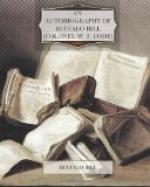Just as he had got his men across the stream we heard a terrific shouting. Looking back toward the knoll where the gun had been left, we saw our negro gun-guard flying toward us, pursued by more than a hundred Indians. More Indians were dancing about the gun, although they had not the slightest notion what to do with it.
Arms turned back with his command and drove the redskins from their useless prize. The men dismounted and took up a position there.
A very lively fight followed. Five or six men, including Major Arms, were wounded, and a number of the horses were shot. As the fight proceeded, the enemy seemed to become steadily more numerous. It was apparent that reinforcements were arriving from some large party in the rear.
The negro troops, who had been boasting of what they would do to the Indians, were now singing a different tune.
“We’ll jes’ blow ’em off’m de fahm,” they had said, before there was an enemy in sight. Now, every time the foe would charge us, some of the darkies would cry:
“Heah dey come! De whole country is alive wif ’em. Dere must be ten thousand ob dem. Massa Bill, does you-all reckon we is ebber gwine to get out o’ heah?”
The major, who had been lying under the cannon since receiving his wound, asked me if I thought there was a chance to get back to the fort. I replied that there was, and orders were given for a retreat, the cannon being left behind.
During the movement a number of our men were killed by the deadly fire of the Indians. But night fell, and in the darkness we made fairly good headway, arriving at Fort Hays just at daybreak. During our absence cholera had broken out at the post. Five or six men were dying daily. For the men there was a choice of dangers—going out to fight the Indians on the prairie, or remaining in camp to be stricken with cholera. To most of us the former was decidedly the more inviting.
“The Rise and Fall of Modern Rome”—was the chapter of frontier history in which I next figured. For a time I was part owner of a town, and on my way to fortune. And then one of those quick changes that mark Western history in the making occurred and I was left—but I will tell you the story.
At the town of Ellsworth, which I visited one day while carrying dispatches to Fort Harker, I met William Rose, who had a contract for trading on the right-of-way of the Kansas Pacific near Fort Hays. His stock had been stolen by the Indians, and he had come to Ellsworth to buy more.
Rose was enthusiastic about a project for laying out a town site on the west side of Big Creek, a mile from the fort, where the railroad was to cross. When, in response to a request for my opinion, I told him I thought the scheme a big one, he invited me to come in as a partner. He suggested that after the town was laid out and opened to the public we establish a store and saloon.




